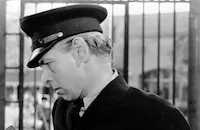Our Vines Have Tender Grapes

Brief Synopsis
Cast & Crew
Roy Rowland
Edward G. Robinson
Margaret O'brien
James Craig
Frances Gifford
Agnes Moorehead
Film Details
Technical Specs

Synopsis
While walking down a road in Fuller Junction, Wisconsin, a town settled by Norwegian immigrants, seven-year-old Selma Jacobson tries to impress her five-year-old cousin, Arnold Hanson, by throwing a rock at a squirrel. Much to Selma's dismay, the rock hits the squirrel and kills it. While Selma tearfully mourns the death of the squirrel, Ingeborg Jensen, a young, emotionally frail Norwegian woman, approaches Selma and Arnold and offers them her friendship. Ingeborg's visit is interrupted, however, by her strict father Kurt, who demands that she return to her chores. Later, while driving Arnold and Selma home, Nels Halverson, the editor of the local newspaper, stops to greet Viola Johnson, the new schoolteacher, who has just arrived from Milwaukee. Viola accepts a ride from Nels, and when asked about her impression of Fuller Junction, she complains that the town is too small for her. She also tells Nels that she is working on her doctorate in education, and that she was sent to Fuller Junction because she is of Norwegian descent and speaks Norwegian. Determined to change her impression of Fuller Junction, Nels offers to show Viola some of the town's hidden charms. When Selma returns home, she reports the squirrel incident to her devoted father Martinius, who tries to help his daughter forget about it by giving her a new calf. Viola, meanwhile, befriends Ingeborg and encourages her to enroll in school. Her efforts are thwarted, however, when Kurt refuses to allow Ingeborg to leave the farm. One day, Martinius punishes Selma for selfishly refusing to share her rollerskates with Arnold, and sends her to bed without dinner. Later that night, Martinius, feeling guilty about punishing Selma, takes her to see a circus troupe that is passing through town. A short time later, Ingeborg dies unexpectedly, and her death saddens Viola, the only person in town who made an effort to understand her. A romance eventually develops between Nels and Viola, but Viola resists further intimacy because she plans to return to Milwaukee. On Christmas Day, at her church, Selma gives a moving recitation of the story of the Nativity, and afterward presents her father with a brand new knife. Months later, when springtime floodwaters engulf the town, Selma and Arnold play in an old bathtub, which they use as a makeshift rowboat. The two quickly lose control of the tub, however, and are carried away by a raging current. The near tragedy ends happily, however, when Arnold and Selma are rescued by some of the townspeople. One night, during a thunderstorm, Bjorn Bjornson's barn catches fire and is destroyed. At a church service, Nels solicits donations to help the Bjornsons rebuild their barn. The townspeople drop only a few coins into collection box until Selma shames everyone by generously donating her calf. Her donation inspires the townspeople to give more money, and prompts Viola to reconsider her harsh judgment of the town. Realizing that she has fallen in love with both the town and Nels, Viola decides to stay in Fuller Junction.

Director

Roy Rowland
Cast

Edward G. Robinson

Margaret O'brien

James Craig

Frances Gifford

Agnes Moorehead

Morris Carnovsky

Jackie "butch" Jenkins

Sara Haden

Greta Granstedt

Dorothy Morris
Arthur Space

Elizabeth Russell

Louis Jean Heydt

Charles Middleton
Francis Pierlot
Johnnie Berkes

Arthur Hohl
Tommye Adams
Rhoda Williams
Crew
Edward Baravalle
Kay Carter
Mark Davis
Jack Dawn
Cedric Gibbons
A. Arnold Gillespie
Danny Hall
Horace Hough
Hugh Hunt
Irene
Bronislau Kaper
Millard Kaufman
Standish J. Lambert
A. Lindsley Lane
Frank B. Mackenzie
M. J. Mclaughlin
Warren Newcombe
Douglas Shearer
Robert W. Shirley
Robert Sisk
Newell Sparks
William Steinkamp
Michael Steinore
Robert Surtees
Keith Weeks
John A. Williams
Edwin B. Willis
Ralph E. Winters

Videos
Trailer
Hosted Intro
Film Details
Technical Specs

Articles
Our Vines Have Tender Grapes
That the former Little Caesar would even have been considered for the role of Margaret O'Brien's father in this touching tale of small-town America is a tribute to Robinson's versatility and tenacity. He had fought for more varied roles throughout his career, impressing audiences and studio executives with his work as a pioneering medical researcher in Dr. Ehrlich's Magic Bullet (1940), a hobo trying to save face at his class reunion in Tales of Manhattan (1942) and a tough-talking insurance investigator in Double Indemnity (1944). In Our Vines Have Tender Grapes, he tugged at the heart strings as a simple man who drives all night so his daughter can see a circus elephant and gives up his dream of building a new barn to help out a neighbor who's lost everything. His performance earned widespread raves. Even James Agee, long an opponent of the studio star system, praised Robinson, O'Brien and Agnes Moorehead (as Robinson's wife) for their simple natural acting.
Robinson was thrilled to be working with screenwriter Dalton Trumbo, whom he would describe in his memoirs as "hot-headed, wildly gifted, inordinately progressive, and, it seemed to me, intensely logical." Trumbo had already scored back-to-back hits at MGM with the wartime fantasy A Guy Named Joe (1943) and the documentary style Thirty Seconds Over Tokyo (1944). For Our Vines Have Tender Grapes, he drew on his small-town Colorado roots to flesh out the characters in George Victor Martin's episodic novel. With three successes in a row, he negotiated an unprecedented contract at MGM, guaranteeing him $75,000 per picture and the right to work at home, where he slept all day and typed through the night -- in the bathtub.
But Trumbo's world would soon come crashing down when he was called as one of the Hollywood Ten to testify before the House Un -American Activities Committee (HUAC) about his alleged affiliation with Communist organizations. The Ten's refusal to answer questions about their political affiliations led to prison sentences and the birth of the Hollywood blacklist. Unable to work, Trumbo appealed to Robinson for a loan to help keep his family together. When word got out that Robinson had written him a check for $2,500, the star found himself unable to find work either. Robinson refused to name names or publicly declare himself a "commie dupe," so he remained unemployed, despite appeals to FBI head J. Edgar Hoover to help him clear his name. It took three appearances before the HUAC before he could finally return to work.
Ironically, Trumbo never stopped working during that time. He wrote scripts under pseudonyms and through fronts, even smuggling one script out of prison. And he won Oscars® for The Brave One (1956) and Roman Holiday (1953) -- but not under his own name. The latter film almost led to another encounter with one of the actors he'd written Our Vines Have Tender Grapes for. In the late '50s, he got a call from Margaret O'Brien's mother. By this time, O'Brien's days as a child star were over, and her mother was hoping to find a comeback vehicle to lead her to adult stardom. She approached Trumbo about writing a script for her daughter, initially claiming she wanted him because Our Vines Have Tender Grapes had been one of her daughter's best films. Then she admitted she was sure a picture like Roman Holiday would put her daughter back on top. Refusing to admit or deny that he had written the film, Trumbo suggested she turn to Ian McLellan Hunter, the writer who had put his name on the script. Ironically, Hunter was also on the blacklist by that time -- proving that the real world was a far cry from the simple American community Trumbo had written about in Our Vines Have Tender Grapes. Ultimately, O'Brien never got her comeback vehicle, though audiences will long remember her as the farm girl riding on an elephant's trunk and giving up her pet calf to save a neighbor from bankruptcy.
Producer: Robert Sisk
Director: Roy Rowland
Screenplay: Dalton Trumbo
Based on the Novel by George Victor Martin
Cinematography: Robert Surtees
Art Direction: Cedric Gibbons, Edward Carfagno
Music: Bronislau Kaper
Principal Cast: Edward G. Robinson (Martinius Jacobson), Margaret O'Brien (Selma Jacobson), James Craig (Nels Halverson), Agnes Moorehead (Bruna Jacobson), Jackie "Butch" Jenkins (Arnold Hanson), Morris Carnovsky (Bjorn Bjornson), Frances Gifford (Viola Johnson), Sara Haden (Mrs. Bjornson), Charles Middleton (Kurt Jensen).
BW-106m. Closed captioning
by Frank Miller

Our Vines Have Tender Grapes
Quotes
Trivia
The trailer for this film includes a specially shot scene of Margaret O'Brien visiting with Spencer Tracy. Tracy tells the child star he never wants to make a movie with her because she's too good for him!
Notes
The title of the film was taken from the Song of Solomon. II. 15: "Take us the foxes, the little foxes that spoil the vines; For our vines have tender grapes." Some Hollywood Reporter production charts list Connie Gilchrist in the cast, but she did not appear in the final film. Portions of the film were shot at the Rowland V. Lee Ranch in the San Fernando Valley of CA. In July 1946, according to a Hollywood Reporter news item, Mrs. Selma Martin, the estranged wife of author George Victor Martin, and Arnold Hansen, a Tacoma, WA, salesman, filed a $25,000 lawsuit against M-G-M, claiming that the film was based on their lives, and that the picture caused them to suffer "undue public attention, mental anguish and humiliation." The outcome of the suit is not known. Margaret O'Brien and Frances Gifford recreated their roles for a Lux Radio Theatre version of the story, which was broadcast on September 2, 1946.
















